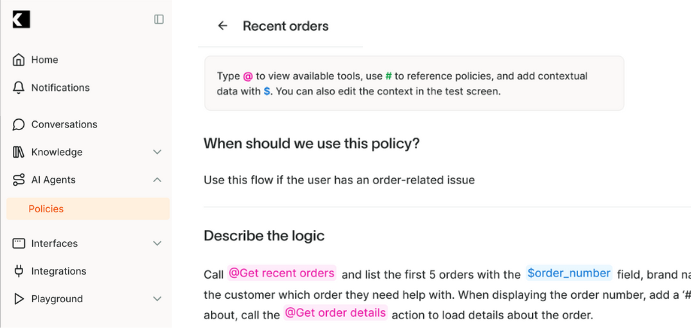Ingredients
Magento, Salesforce Service Cloud, and Kodif.
What are AI Policies?

At Kodif, we’re excited to announce the launch of Policies—a powerful, dynamic solution designed to revolutionize the way CX managers handle customer support. Unlike traditional flows, which are rigid and complex, Policies empower non-technical users to create and manage customer interactions with ease. Written in natural language, Policies make it simple to define and refine customer experiences without needing to rely on complicated flowcharts or scripting. This approach is not only user-friendly but also self-serve, enabling CX teams to quickly translate existing Standard Operating Procedures (SOPs) into automation, saving valuable time and resources.
The flexibility of Kodif Policies ensures that businesses can offer personalized, context-driven support while continuously improving customer experiences. With Policies, you can experiment with different strategies to optimize outcomes such as CSAT, revenue, and retention—all without the need to rebuild complex workflows. Whether it’s automating routine interactions or testing new approaches for high-stakes scenarios, Policies provide a scalable, adaptable solution that aligns with your business goals. While flows still have their place in sensitive, high-risk situations, Policies offer an agile alternative that helps businesses innovate faster and deliver exceptional, tailored experiences at scale.
“Update email address” ticket type explained
In customer support, an “Update email address” ticket type refers to requests from customers who want to change the email address linked to their account. This is a common request as customers may change their email providers, consolidate accounts, or rectify errors in their current email address. Efficient handling of these requests is crucial as it involves updating personal information that is often tied to billing, notifications, and account access. Ensuring a smooth and secure transition during this update process not only enhances customer trust but also maintains the integrity of customer records across systems.
Which Platforms does this AI policy work on?
This AI policy is applicable to Magento, Salesforce Service Cloud, and Kodif. Kodif integrates seamlessly with all other major platforms, ensuring a cohesive approach to handling customer support requests regardless of the system in use.
When should I use this policy?
Use this policy when a customer requests to update the email address associated with their account. This policy is particularly useful for ensuring the accuracy of customer data across platforms and maintaining consistent communication.
Policy logic
Type @ to view available tools, use # to reference policies, and add contextual data with $. You can also edit the context in the test screen.
- Ask for the user’s current email address.
a. Use @get_magento_account_details to check if the provided email exists in Magento.
- Ask for the New Email Address.
a. Ask the customer to provide the new email address they want to use.
- Check for Duplicate Accounts.
a. Use @check_email_exists to verify if the new email address is already associated with another account.
b. If it is, use the macro: “The email address you provided is already linked to another account. Please provide a different email address or contact support for further assistance.”
- Update the Email Address in Magento.
a. Use @update_customer_email(current_email: str, new_email: str) to update the customer’s email in Magento.
b. Inform the customer that their email has been successfully updated.
Example policy
Use this policy when a customer requests to update the email address associated with their account. This is essential for maintaining up-to-date contact information and ensuring seamless communication.
Logic
Type @ to view available tools, use # to reference policies, and add contextual data with $. You can also edit the context in the test screen.
- Ask for the user’s current email address.
a. Use @get_salesforceservicecloud_account_details to check if the provided email exists in Salesforce Service Cloud.
- Ask for the New Email Address.
a. Ask the customer to provide the new email address they want to use.
- Check for Duplicate Accounts.
a. Use @check_email_exists to verify if the new email address is already associated with another account.
b. If it is, use the macro: “The email address you provided is already linked to another account. Please provide a different email address or contact support for further assistance.”
- Update the Email Address in Salesforce Service Cloud.
a. Use @update_customer_email(current_email: str, new_email: str) to update the customer’s email in Salesforce Service Cloud.
b. Inform the customer that their email has been successfully updated.


